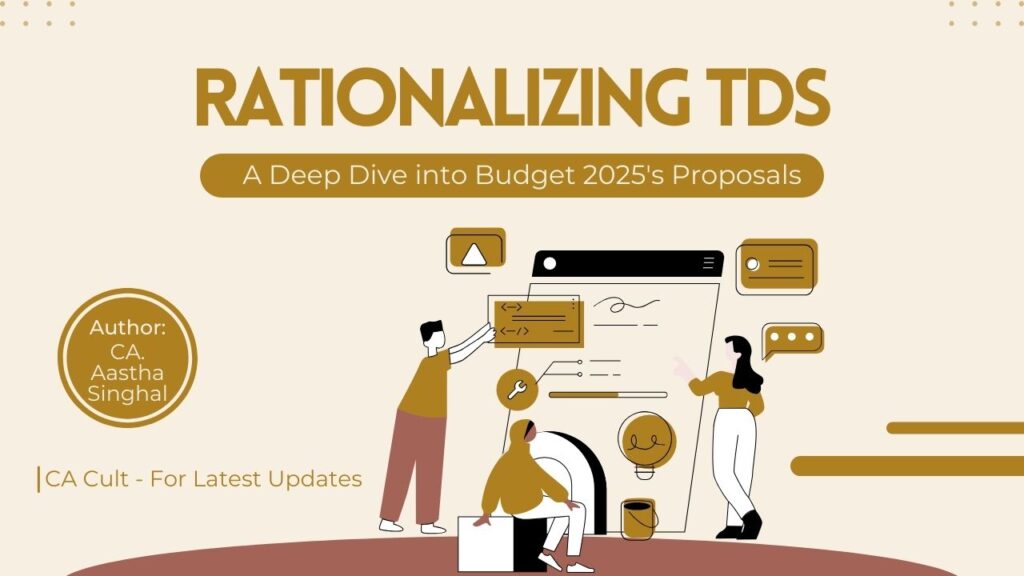Rationalizing TDS: A Deep Dive into Budget 2025’s Proposals
TDS Threshold Rationalization: A Comprehensive Analysis
Tax Deducted at Source (TDS) plays a crucial role in the Indian taxation system by ensuring tax collection at the point of income generation. However, various TDS provisions had different threshold limits, leading to compliance burdens and inefficiencies.
To streamline the process, the government has proposed rationalizing TDS thresholds across multiple sections. These changes aim to reduce the tax deduction burden on small taxpayers and improve ease of compliance.
This blog provides a detailed analysis of the proposed changes, their impact, and practical issues that may arise due to these modifications.
Understanding the Proposed TDS Threshold Changes
The table below summarizes the proposed changes in TDS thresholds:
| S. No | Section | Nature of Payment | Current Threshold | Proposed Threshold |
|---|---|---|---|---|
| 1 | 193 | Interest on securities | Nil | ₹10,000 |
| 2 | 194A | Interest (excluding securities) | (i) ₹50,000 (senior citizens) (ii) ₹40,000 (others) (iii) ₹5,000 (other cases) | (i) ₹1,00,000 (senior citizens) (ii) ₹50,000 (others) (iii) ₹10,000 (other cases) |
| 3 | 194 | Dividend for individuals | ₹5,000 | ₹10,000 |
| 4 | 194K | Income from mutual fund units | ₹5,000 | ₹10,000 |
| 5 | 194B | Lottery winnings | ₹10,000 (aggregate in a year) | ₹10,000 (per transaction) |
| 6 | 194BB | Winnings from horse races | ₹10,000 (aggregate in a year) | ₹10,000 (per transaction) |
| 7 | 194D | Insurance commission | ₹15,000 | ₹20,000 |
| 8 | 194G | Commission/prize on lottery tickets | ₹15,000 | ₹20,000 |
| 9 | 194H | Commission or brokerage | ₹15,000 | ₹20,000 |
| 10 | 194-I | Rent | ₹2,40,000 per year | ₹50,000 per month |
| 11 | 194J | Professional/technical fees | ₹30,000 | ₹50,000 |
| 12 | 194LA | Enhanced compensation for land acquisition | ₹2,50,000 | ₹5,00,000 |
Impact of the Changes
1. Relief for Small Taxpayers
• The increase in thresholds means fewer small taxpayers will face TDS deductions, reducing their compliance burden.
• Example: Previously, a senior citizen earning ₹60,000 in interest from a bank deposit was subject to TDS (as the threshold was ₹50,000). Now, with the new ₹1,00,000 threshold, they will not face TDS deductions.
2. Reduced Refund Situations
• Many taxpayers, especially retirees and small investors, had to claim refunds due to TDS deductions on small incomes.
• The increased thresholds will reduce unnecessary tax deductions and refund claims.
3. Simplification for Businesses
• Businesses dealing with commissions, rent, and professional services will benefit from higher TDS limits, leading to easier cash flow management.
• Example: A company paying ₹45,000 per year in professional fees earlier required TDS deduction. Now, only payments exceeding ₹50,000 will be subject to TDS, simplifying compliance.
4. Rent TDS Becomes Monthly Instead of Annual
• The TDS threshold for rent has changed from ₹2,40,000 per year to ₹50,000 per month.
• This means individuals paying monthly rent above ₹50,000 will now have to deduct TDS every month instead of waiting for the annual limit to be breached.
Practical Issues Due to Changes
1. Increased Compliance for High-Rent Tenants
• Individuals paying high rent (above ₹50,000 per month) will need to deduct TDS each month, file returns, and deposit tax with the government.
• Issue: Many tenants may not be aware of this requirement, leading to penalties for non-compliance.
• Solution: Awareness campaigns and simplified online TDS payment mechanisms are needed.
2. Tracking of Winnings Becomes More Stringent
• With Section 194B now applying on each winning transaction above ₹10,000, tax authorities will need better tracking mechanisms to ensure compliance.
• Issue: Some winners may receive multiple smaller winnings just below ₹10,000, creating a loophole.
• Solution: Government may implement cumulative tracking of winnings from the same lottery provider.
3. Mismatches in TDS Deductions by Banks and Depositors
• The threshold for TDS on interest (Section 194A) has increased, but banks might still follow old systems, leading to incorrect deductions.
• Issue: Depositors may still see TDS deductions if banks take time to update their systems.
• Solution: Banks should proactively update their software and inform customers.
4. Professional Fees & Commission-Based Businesses May Need Better Bookkeeping
• Increased thresholds under Sections 194H (brokerage), 194D (insurance commission), and 194J (professional fees) mean businesses need to track payments more carefully to comply with the new limits.
• Issue: Businesses might fail to deduct TDS properly if they rely on old limits, leading to penalties.
• Solution: Companies should update accounting software and educate finance teams on the new rules.
Illustrative Examples of TDS Impact
Example 1: Senior Citizen Benefitting from Higher Interest Threshold
• Before Change: A senior citizen earning ₹80,000 interest from a bank saw TDS deducted on ₹30,000 (₹80,000 – ₹50,000 threshold).
• After Change: With the threshold increased to ₹1,00,000, no TDS will be deducted.
Example 2: Business Paying Rent Above New Monthly Limit
• Scenario: A business pays office rent of ₹55,000 per month.
• Before Change: No TDS until the total rent exceeded ₹2,40,000 per year.
• After Change: TDS now applies every month as rent exceeds ₹50,000 per month.
Example 3: Professional Fees and TDS Applicability
• Scenario: A freelancer earns ₹45,000 from one company and ₹10,000 from another.
• Before Change: TDS applied on the ₹45,000 payment, as it exceeded ₹30,000.
• After Change: No TDS, as the threshold is now ₹50,000.
Conclusion: A Positive Step with Some Compliance Challenges
The rationalization of TDS thresholds is a welcome move that simplifies tax compliance, reduces TDS deductions for small taxpayers, and prevents unnecessary refund claims.
However, certain changes—like the monthly TDS on rent and per-transaction taxation of lottery winnings—may lead to increased compliance burdens for some taxpayers.
To ensure a smooth transition, businesses, banks, and individuals must stay updated, adjust their financial practices, and ensure timely compliance with the new TDS rules.
Would you like assistance in understanding how these TDS changes affect your financial transactions? Let us know in the comments!
Go To Memorandum
Go To Finance Bill 2025
Read More on Union Budget 2025

